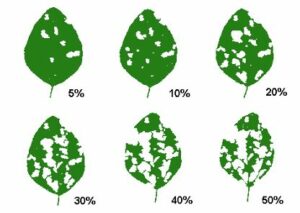I’ve received several reports, over the last two days, on fall armyworms (FAW) infesting double cropped soybeans. Almost every one of these calls were incidents of grass escapes and the lone exception was FAW migrating from a grass turn-row into v-stage beans. Somethings to keep in mind, vegetative soybeans can withstand 30% defoliation before yield loss and reproductive stage soybeans can withstand 20% defoliation before yield loss. Below is guide to help gauge defoliation levels.

If you do see armyworms it shouldn’t be automatically assumed that pyrethroids won’t be effective. We don’t fully understand why pyrethroids provided inconsistent control in 2021. Resistance is a possibility but overlapping generations causing mixing of various worm sizes resulting the appearance of poor control is another possibility. Also, since armyworms don’t overwinter in Tennessee and there is no evidence of reverse migration, the armyworms we experienced in 2021 won’t be the same ones we see in subsequent years. However, if pyrethroids do fail to control armyworms please contact your local county agent.
The FAW we are currently facing are the rice/grass strain, not the corn strain. They are impossible to distinguish visually but they are very host specific. Grass strain FAW almost always colonize grass, not soybeans, corn or cotton. Corn strain FAW almost always infest corn, soybeans or cotton not grass or rice. Another key difference is grass strain FAW are typically very susceptible to pyrethroids while corn strain are resistant. What happens when grass escapes occur in soybeans is the grass is controlled and FAW are forced off of a dying host on to soybeans. They don’t necessarily want to eat the soybeans but have no other options. If you have FAW in your fields and haven’t controlled grass yet, adding a pyrethroid would be a prudent step to save another potential trip. If you want other options outside of pyrethroids or are concerned they won’t work that list is here:
Acephate: 0.75 lb ai/ac,
Diamond: 6.0 fl oz/a,
Intrepid 4.0 fl oz/a,
Intrepid Edge 4.0 fl oz/a,
Vantacor 1.2 fl oz/a,
Elevest 5.6 fl oz/a,
Besiege 7.0 fl oz/a
Don’t automatically reach for the diamides (Vantacor, Elevest, Besiege) these products provide excellent FAW control but are costly. All of the above products will provide satisfactory control of FAW in soybeans.

